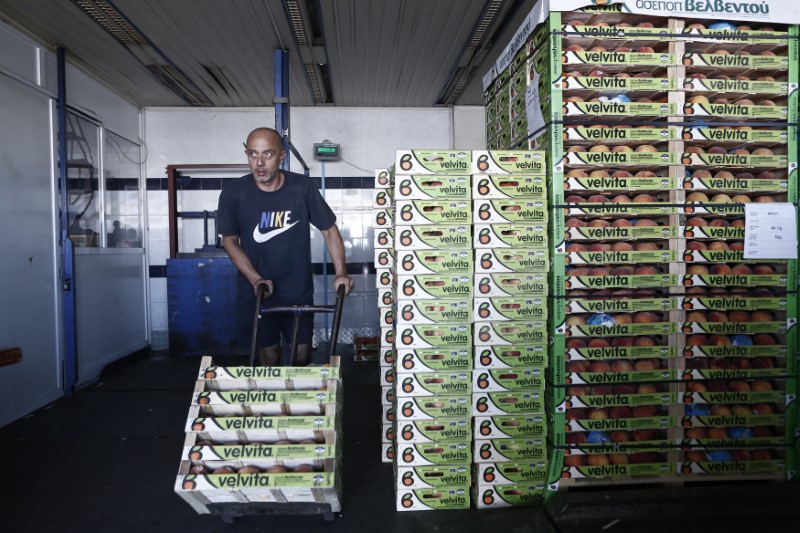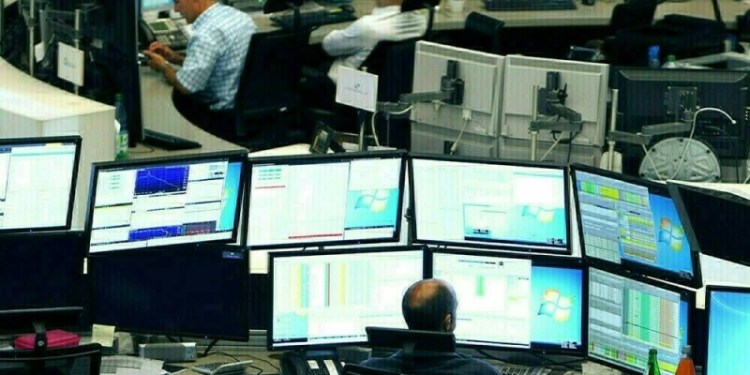 © Reuters. An employee pushes a trolley loaded with crates of peaches at the central vegetable market in Athens
© Reuters. An employee pushes a trolley loaded with crates of peaches at the central vegetable market in AthensBy Francesco Guarascio
BRUSSELS (Reuters) – Euro zone economic sentiment rose in November for the sixth consecutive month to its highest level in more than 17 years, data from the European Commission showed on Wednesday, while inflation expectations grew.
The new rise confirmed the solid economic recovery of the 19-country currency bloc despite the strong euro and political crisis in two of its largest members, Germany and Spain.
The buoyant sentiment was also compounded by expectations of higher prices among manufacturers and consumers, a positive signal for the European Central Bank’s efforts to raise inflation closer to target.
The European Commission’s monthly survey showed that sentiment in the euro zone rose to 114.6 in November from 114.1 in October, in line with the average forecast of economists polled by Reuters.
It was the highest reading since October 2000, and well above the long-term average of 100.0.
The Commission’s overall business climate index, a separate indicator which points to the phase of the business cycle, also rose to 1.49 in November from 1.44 in October, the highest level in 10 years, albeit below market expectations of a rise to 1.53.
Optimism kept growing in the industrial sector, reaching 8.2 points, its highest level ever since 1990, when data began to be collected.
Consumers’ exuberance was also confirmed from earlier estimates at 0.1, the first positive reading since January 2001 and a near 17-year high.
British consumers joined the positive trend, as their confidence rose to -5.2 points from -5.5 in October. The Commission figures showed the opposite trend emerged from a poll by YouGov and the Centre for Economics and Business Research, a consultancy, which pointed to UK consumer confidence slumping in November.
In the euro zone, economic sentiment improved in November in all surveyed sectors, excluding retail trade, where it fell to 4.2 from 5.5 in October.
INFLATION
Optimism in the industry sector was in part driven by expectations of higher selling prices which jumped to 11.1 from 8.7 points last month, as Christmas shopping approaches.
Consumers also expected more inflation in the coming months, a forecast that is seen restraining their purchases, but that sends a further positive signal to the ECB, which aims to bring inflation close to 2 percent.
Inflation was at 1.4 percent in October on the year. The average forecast of economists polled by Reuters points to an acceleration to 1.6 percent in November. Official flash estimates will be released on Thursday by the EU statistics office Eurostat.
Economists, however, remained cautious and saw no signs of earlier moves by the ECB on rates.
“Inflation expectations are rising only slowly. This supports the ECB’s very gradual approach to normalizing monetary policy. We think that it will wait until late 2019 to raise interest rates,” Jack Allen of research firm Capital Economics said.
Inflation expectations went down in the services sector, the largest in the euro zone economy, despite the general booming trend.
“This indicates that not much is to be expected of inflation in 2018, even with improving economic conditions,” said Bert Colijn, economist at ING bank.
Source: Investing.com





























